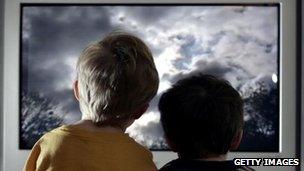4G to affect TV reception in two million homes
- Published

Only Freeview TV and boxes are likely to be affected by 4G
Filters will be provided for Freeview televisions which experience reception problems following the roll out of 4G later this year.
Ofcom estimates that the TV viewing in up to 2.3 million British households could be affected by 4G but only 40% of them have Freeview.
Satellite receivers will not be affected, the watchdog claims.
A fund provided by the 4G auction winners will be used to pay for filters for those who need them.
At the moment only mobile operator EE is able to offer customers the 4G service, which provides faster mobile internet connections.
The other operators are currently bidding for licences in an auction run by telecoms watchdog Ofcom.
Up to £180m from the auction will be used to fund the filters, a spokesperson from Ofcom said.
However, around 1% of affected Freeview households will be unable to use them and will be offered an alternative instead.
Ofcom estimates there may be fewer than 1000 homes in the UK who will not be able to access those alternatives either and will be left without television services.
A not-for-profit organisation called Digital Mobile Spectrum Limited (DMSL) has been created to tackle the problem.
"I look forward to working closely with broadcasters and mobile network operators to ensure everyone continues to be able to receive their current TV service," said newly appointed chief executive Simon Beresford-Wiley.
"DMSL plans to pre-empt the majority of potential interference issues caused by 4G at 800 MHz and existing TV services. We're focused on being able to provide anyone who may be affected with the information and equipment they'll need to ensure they continue to receive free-to-air TV."
Last month Freeview homes in South Wales had to retune their TVs and boxes following technical changes to a transmitter in order to make way for 4G.
- Published8 February 2013
- Published23 January 2013